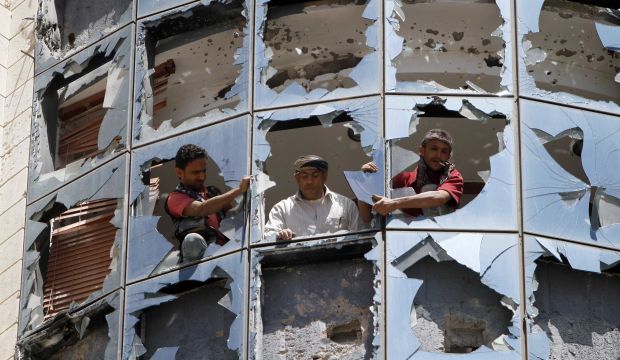
Workers clear broken glass from windows at a building damaged by fighting between Shi’ite Houthi rebels and government forces in Sana’a on September 28, 2014. (REUTERS/Mohamed al-Sayaghi)
“The reality is Sana’a is now occupied by armed groups belonging to Ansar Allah,” Benomar said. “These groups have taken over Sana’a International Airport, all government buildings and important facilities, and it [Ansar Allah] is acting as though it were a replacement for the state.”
The Shi’ite Houthi movement and Ansar Allah have occupied key sites in the capital since last Saturday, following a month-long series of large protests staged by the group demanding the appointment of a new government and the reinstatement of fuel subsidies.
A UN-brokered ceasefire was signed between the government and the Houthis last Sunday agreeing to the Houthis’ demands, but also stipulating an end to violence and protests, and the appointment of members of Ansar Allah to act as advisers to President Abd Rabbuh Mansur Hadi, together with some members of the pro-secessionist movement Al-Hirak.
An addendum to the agreement was also signed the following Saturday, stipulating the withdrawal of Houthi and Ansar Allah fighters from areas they are currently occupying and the return of government forces to these areas. It also tasked the Houthis and Ansar Allah with returning all weapons seized from the state.
However, the clashes have since continued despite the agreement, with the Houthis continuing to lay siege to several government buildings including the intelligence headquarters, as well as breaking to the homes of a number of top-ranking security officials.
Despite the continuing instability in Sana’a and elsewhere, Benomar said the agreement would be “implemented categorically.”
He said: “There will be no room for [picking and choosing] with regards to the relationship between the agreement and the addendum. We have always insisted this is a complete agreement that cannot be divided; all its articles must be implemented fully whether they are related to political, economic or security issues.”
The Un enovy said the situation in the country was “still very dangerous,” and that it was up to all the different political sides involved to “cooperate in order to fully implement all articles” of the agreement and the addendum.
“If this agreement is [fully] implemented, the country will be able to come out of this crisis,” he added.
In addition to the Houthis and Ansar Allah, Benomar also partly blamed the current state of chaos in the country on figures from the regime of former president Ali Abdullah Saleh, who was ousted from power following widespread protests in the country in 2012.
He said: “What happened in Yemen was the result of miscalculations made by all sides, which caused the situation to deteriorate to this dangerous level. The danger comes from the Ansar Allah group and others using violence as a means to achieve political ends, exploiting the weakness of the state and the disintegration of the army. Also, the vengeful role played by leadership figures from the previous regime who formed alliances [with the Houthis] and helped the Houthis enter the capital.”
Speaking about incidents relating to Houthis breaking into the homes of political and security figures, Benomar said this was “still happening despite the assurances we have been receiving from the leadership of Ansar Allah.”
He said the UN sanctions committee on Yemen was now ready to investigate “individuals and groups” that could be sanctioned in accordance with UN resolution 2140, which stipulates travel bans and asset freezes on ‘individuals and groups seeking to derail Yemen’s political transition,” according to the language of the resolution.
“I am willing also to condemn and investigate any breach of the agreement from any side,” Benomar said, and warned that continuing violence threatened Yemen’s fragile political transition.
“If the political establishment is present and everyone truly has good intentions then the political situation will progress and we will be able to implement all the gains of the transitional period, including agreeing on drafting a new constitution and holding general elections in light of the constitution,” he said. “But if violence continues to be used as an alternative to dialogue, and if the militias continue to occupy the capital and spread throughout the streets and loot the state’s weapons stockpiles, this will hinder the political process.”
Speaking of the UN’s expectations regarding the most likely scenario for the country, and any steps that can be taken to stop further deaths taking place, Benomar said: “The UN Security Council issued a statement in light of these latest events which said this agreement is the ideal way to achieve stability . . . without further violence.”
He said all members of the Security Council members called upon “all sides to implement fully and immediately all the articles of this agreement without omission, including returning medium and heavy weapons to the relevant state institutions. The Council also stresses that President Abd Rabbuh Mansur Hadi represents the only legitimate authority in the country, and that all tribes and political parties in the country need to unite behind him to keep the country on the road to stability and security.”
Meanwhile, signs of another brewing conflict were apparent in Yemen and Sunday, this time between the Shi’ite Houthis and the local Al-Qaeda affiliate, Al-Qaeda in the Arabian Peninsula (AQAP).
AQAP took responsibility for a suicide bomb attack on a hotel being used as a base by the Houthis in the city of Ma’rib in central Yemen, killing at least 15 people and wounding 50 more, according to Reuters.
AQAP, a radical Sunni organization, regards Shi’ites like the Houthis as heretics. While it has so far largely focused its attacks on government and security force targets, the latest bombing indicates that the group may begin to pursue a more broadly sectarian agenda in its attacks in the future.
“Dozens of dead and wounded from the . . .Houthis in a martyrdom operation by Ansar Al-Shari’a using a booby-trapped car in Ma’rib,” the group said in a statement on its Twitter account.
